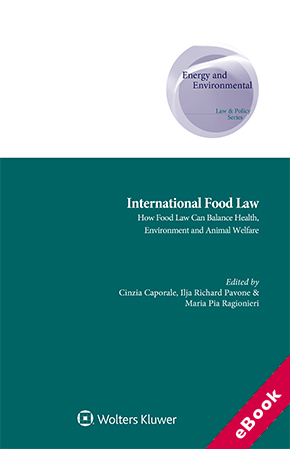
The device(s) you use to access the eBook content must be authorized with an Adobe ID before you download the product otherwise it will fail to register correctly.
For further information see https://www.wildy.com/ebook-formats
Once the order is confirmed an automated e-mail will be sent to you to allow you to download the eBook.
All eBooks are supplied firm sale and cannot be returned. If you believe there is a fault with your eBook then contact us on ebooks@wildy.com and we will help in resolving the issue. This does not affect your statutory rights.
International Food Law is a useful guide that critically analyses under an ethical and legal point of view if the current food production process based on the industrialization of agriculture and over-exploitation of natural resources is appropriate to guarantee a sustainable development, respectful of the right to adequate nutrition of future generations. The growth of the world population and the major request for nutriment raises the issue of how to conciliate the right to food with the protection of the environment and biodiversity, of human health and animal welfare. Few aspects of today’s food system demand such an urgent response as our ability to produce sustainable nutrition. Yet at the same time as malnutrition plagues the world, overuse of land, water, and energy in the agricultural and livestock sectors exacerbates environmental degradation and climate change. This important book, focusing on the interrelation between food law, environmental law, and animal law, investigates the main legal issues related to food regulation in a global context.
What’s in this book:
The book’s chapters, written by eminent scholars and leading experts at Food and Agriculture Organization (FAO) from different legal backgrounds and countries, explore such issues and topics linked to food production as the following:
Throughout, there is a reference to food law and regulations on a domestic, regional, and international level, with particular attention to the European Union (EU), the U.S., the World Trade Organization (WTO) and the work of the FAO.
How this will help you:
As an insightful analysis of the main challenges of modern food law in the COVID-19 era, in its authoritative discussion of the relations among fields of law that are rarely discussed together – food law and the environment, food law and human rights, food law and animal welfare – this collection of chapters will prove to be a valuable resource for both experts working in food governance and security and for lawyers and scholars concerned with environmental management, sustainable development, and human rights around the world.